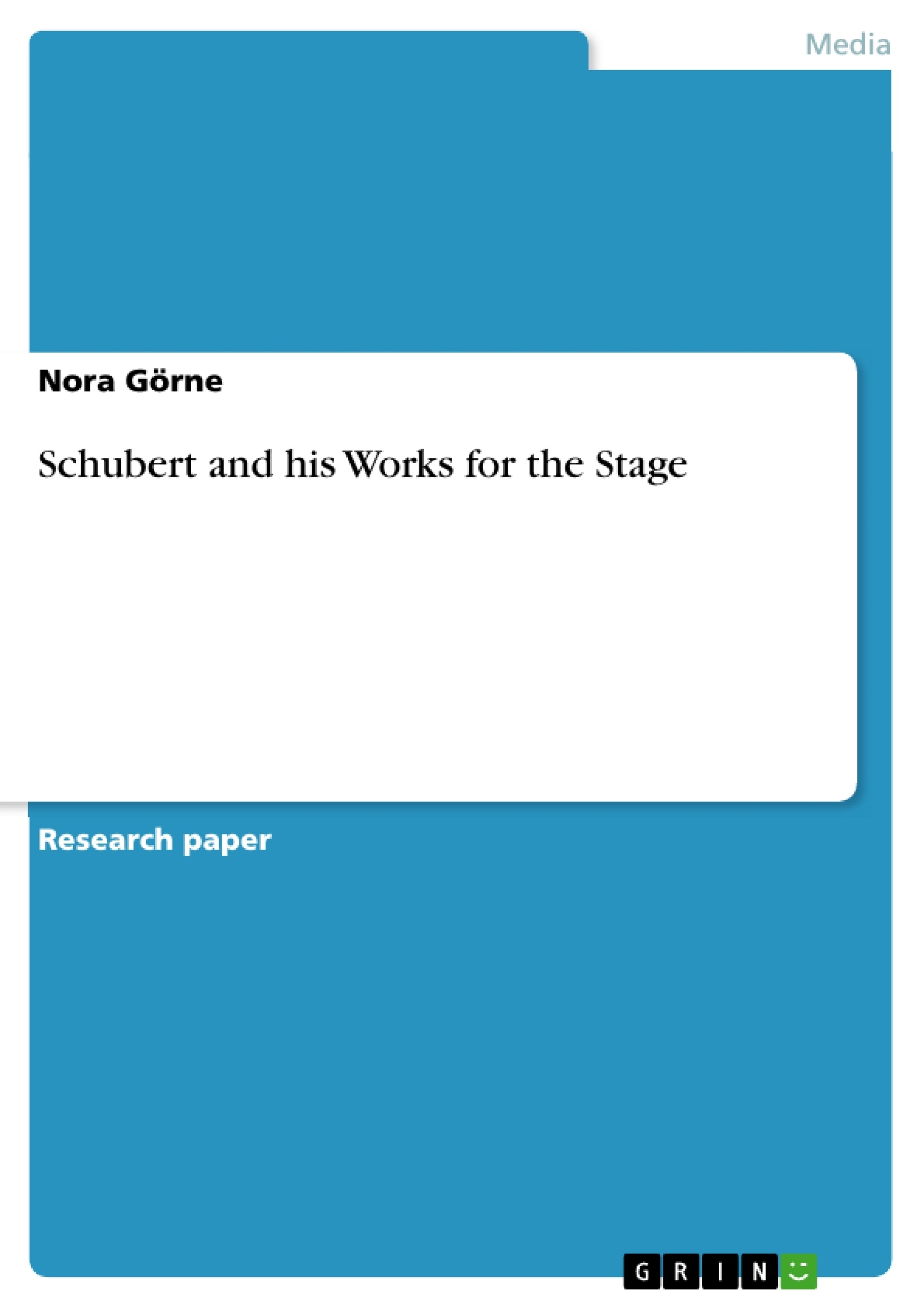Excerpt
Why Have Schubert's Works for the Stage Been Disregarded?
Even persons who describe themselves as Schubert lovers may be surprised by the fact that the master of Lieder Franz Schubert (1797-1828) also composed up to 21 works for the stage. Why these pieces are almost forgotten today, can be answered rather easily. From the twelve pieces which he finished, only four have been performed in his life time and were also not very successful. But also today, the pieces can be scarcely found on the playing list of theatres, even in Germany and Austria. Literature often offers the possible explanation that the used libretti were of bad quality and Schubert, the “lyricist” (Partsch 20), was not able of supplying opera dramatics. The simplification that this assumption contains will be explained, especially in regard to the problematic history of German opera itself.
Before going in-depth, I would like to give an overview of Schubert's works for the stage:
illustration not visible in this excerpt
Figure 1: Schubert's Works for the Stage[6]
The works which received most attention by literature are Alfonso und Estrella and Fierrabras which both were only performed after his death and are the only operas he finished. All other operas are unfinished and/or lost. His other works for the stage range from Singspielen, one scenic oratorio to Zauberopern (“magic operas”) and two scenic plays with music. Furthermore, he wrote two additional pieces for the comic opera Das Zauberglöckchen (La clochette ou le diable page) by Louis Joseph Ferdinand Hérold for the Kärntnertortheater Wien.
The list already shows two main issues: At first sight, the number of works for the stage he composed looks quite impressive if we consider that Schubert died at the age of 31. However, 9 of the 21 works are more or less incomplete. This fact has been used quite often to justify the argument that the libretti were too bad or that Schubert was not able to create opera dramatics as it will be discussed later. However, as musicologist Andrea Lindmayr-Brandl remarks, fragments play a significant role in Schubert's whole œuvre and cannot simply be explained by potential incapacities of Schubert.[7] Furthermore, many pieces are only partly preserved. Famous is for example the bad destiny of Claudine von Villa Bella. As Deutsch remarks, Schubert composed all three acts but the second and third were apparently used to crank up the fireplace when the manuscript was in the possession of Josef Hüttenbrenner (74).
All together only six works can be completely performed the way they were intended by Schubert: Des Teufels Lustschloß, Der Vierjährige Posten, Fernando, Die Zwillingsbrüder, Alfonso und Estrella and Fierrabras. Four of these six works were composed before 1820 and are said to be early experiments by Schubert before he reached the “individual fulfilment of the later ones” (79). For some ambitious directors, it might be an interesting challenge to round off and perform one of the fragments but the fact that only six works of Schubert are complete, complicates musicological research a lot. Also the research in the adaptions of his theatre pieces is complicated by the fact that two of the three Singspiele which had a performance during his life time are now only partly preserved.
But the list also shows that Schubert had a genuine interest in theatre: He started to compose his first Singspiel, Der Spiegelritter, when he was only 14 and he worked on an opera, Der Graf von Gleichen, one year before his death. It is also said that he “discussed an operatic libretto with his friends Bauernfeld and Lachner two days before his death” (Wechsberg 145). Moreover, Joseph von Spaun reports that Schubert was “overjoyed” after he saw Gluck's Iphigenie auf Tauris “ because of the impression of this brilliant music and claimed that nothing more beautiful could exist on earth”[8] (Pfister) Furthermore, it is passed on from his friend von Spaun that he for example even sold some of his school books to watch Beethoven's Fidelio in 1814 (Pfister) which shows that Schubert started to compose opera out of his own appreciation for this form of art and not because he thought it would be an easy way to get famous (Fröhlich 276). However Otto Brusatti might be right with his assumption that Schubert most likely knew that national and international success in a long-term could be gained best in musical theatre (Partsch and Pausch 44) as many other composers thought as well (Wechsberg 142). Almost his whole life, he was concerned with theatre works and he tried to strive for perfection (Höcker 105) notwithstanding the disappointments.
[...]
[1] According to Wechsberg “the most popular playwright in Vienna when Schubert was born” (149)
[2] “magic Singspiel that was a staple of the Viennese popular repertory during the 18th and early 19th
centuries” (Branscombe)
[3] Changed to the latter name due to instigation by the Censorship of Publications Board (Deutsch 191)
[4] Von Mosel states in his autobiography that he wrote a “heroic opera poem: Rüdiger, based on Metastasio's Ruggiero” (Deutsch 192)
[5] Libretto was already banned in 1826 by the Censorship of Publications Board (Deutsch 226)
[6] This list is based on Partsch and Pausch, 132f though their list is incomplete. Information has been added based on the information in Deutsch's Franz Schubert: Verzeichnus seiner Werke in chronologischer Folge
[7] It would go beyond the scope of this essay to discuss the definitions and reasons for his opera fragments but in her book Franz Schubert: Das Fragmentarische Werk Lindmayr-Brandl offers an excellent approach to this issue.
[8] “Er war ganz außer sich über die Wirkung dieser großartigen Musik und behauptete, Schöneres könne es auf der Welt nicht geben”
- Quote paper
- Nora Görne (Author), 2011, Schubert and his Works for the Stage, Munich, GRIN Verlag, https://www.grin.com/document/177728
Publish now - it's free






















Comments